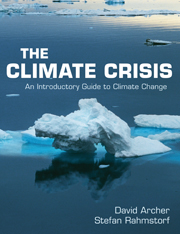Book contents
- Frontmatter
- Contents
- Preface
- 1 Retrospective: what we knew and when we knew it
- 2 Earth's energy budget
- 3 Climate change so far
- 4 Snow and ice
- 5 How the oceans are changing
- 6 The past is the key to the future
- 7 What the future holds
- 8 Impacts of climate change
- 9 Avoiding climate change
- 10 Climate policy
- Epilogue
- References
- Illustration credits
- Index
7 - What the future holds
Published online by Cambridge University Press: 05 March 2013
- Frontmatter
- Contents
- Preface
- 1 Retrospective: what we knew and when we knew it
- 2 Earth's energy budget
- 3 Climate change so far
- 4 Snow and ice
- 5 How the oceans are changing
- 6 The past is the key to the future
- 7 What the future holds
- 8 Impacts of climate change
- 9 Avoiding climate change
- 10 Climate policy
- Epilogue
- References
- Illustration credits
- Index
Summary
Only the final two chapters – Chapters 10 and 11 – of the IPCC Working Group 1 report deal with the future development of our climate. Although only a small part, this is the part of IPCC reports that tends to attract the most media and public attention. The numbers for future warming and future sea level rise are the most widely quoted statements from the IPCC reports, and leaked (and often wrong) numbers circulated in the media months before the report was finalized and published. A great deal of futile (since often erroneous) media speculation and analysis was devoted to the question of whether the IPCC had revised the numbers up or down since the last report (we will come to this issue below). Of course, the media deal with news, and anything that says “… greater than previously expected” or “… less than previously expected” is “news.” On the other hand, “climate is warming just as previously expected” just does not sound like a newspaper headline.
The somewhat one-sided public interest in the future is perhaps one reason why the public tends to think that climate science consists mostly of computer modeling. In reality, painstaking collection and analysis of data is a much bigger part of climate science, and this is reflected in the chapters of the IPCC report dealing with observed past (and ongoing) changes in the climate system. For the future, however, models are indeed all we have.
- Type
- Chapter
- Information
- The Climate CrisisAn Introductory Guide to Climate Change, pp. 125 - 150Publisher: Cambridge University PressPrint publication year: 2009



